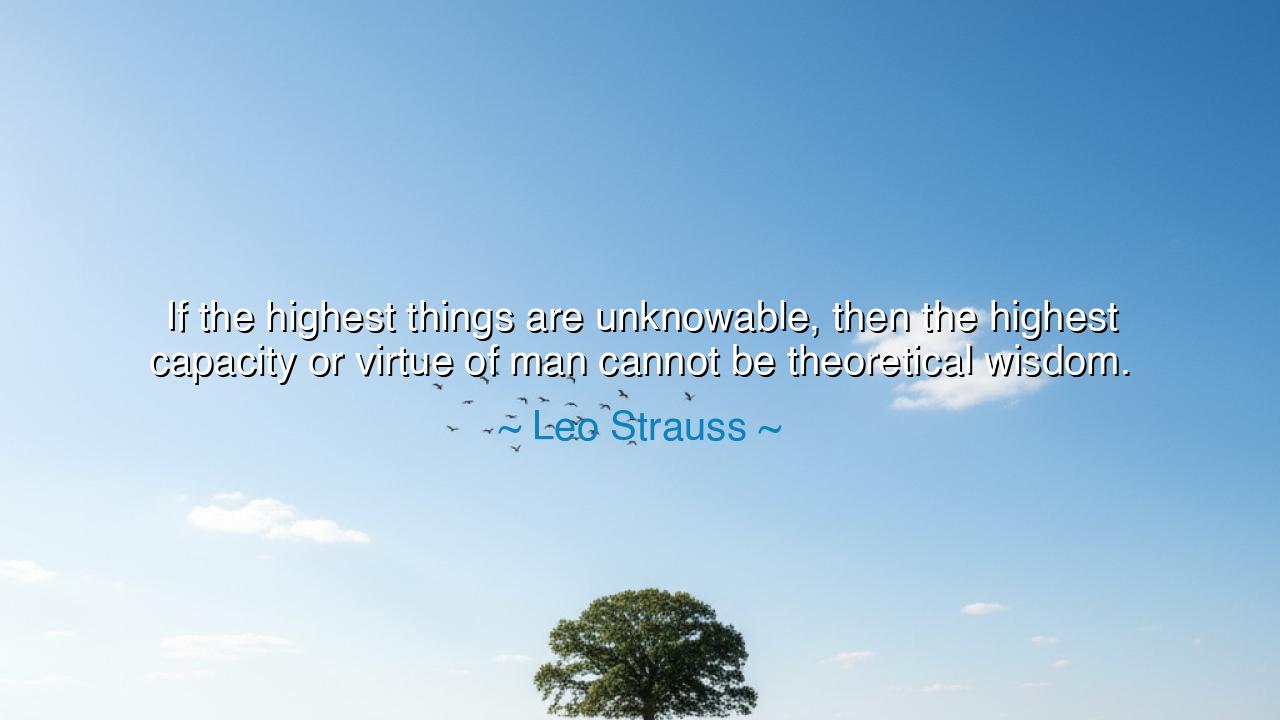
If the highest things are unknowable, then the highest capacity
If the highest things are unknowable, then the highest capacity or virtue of man cannot be theoretical wisdom.






Leo Strauss, interpreter of the ancients in a modern age, proclaims: “If the highest things are unknowable, then the highest capacity or virtue of man cannot be theoretical wisdom.” In these words he strikes at the heart of philosophy’s eternal quest. If the ultimate truths—God, the divine order, the absolute meaning of existence—lie beyond the reach of reason, then the crown of human greatness cannot be the mere pursuit of abstract knowledge. The highest virtue, he warns, must be something other than speculative thought; it must be rooted in how we live, not merely in what we ponder.
The ancients wrestled with this same tension. Plato taught that the highest good was the contemplation of the Forms, and Aristotle exalted theoretical wisdom (sophia) as the noblest life. Yet even they admitted that the divine was a mystery, glimpsed but never fully grasped. Strauss reminds us of this humility: that if the highest things cannot be known, then true human greatness lies not in presumption, but in living according to virtue, in justice, courage, and prudence.
History provides testimony in the life of Socrates, who confessed that he knew nothing of the highest things. Yet this ignorance did not cripple him; it gave him freedom. His greatness lay not in claiming knowledge of the divine, but in embodying wisdom as a way of life—in questioning, in seeking truth, in living with integrity even unto death. In him we see Strauss’s point: that the noblest capacity may not be theoretical possession of truth, but the lived practice of it.
So too in the story of Moses on Sinai. He saw only the back of God, never the full face of the divine. Yet though the highest reality was unknowable, his greatness was not in abstract knowledge but in obedience, in leadership, in bringing law and order to a wandering people. His virtue lay not in speculation but in action, in shaping the lives of generations.
Let the children of tomorrow remember: there are truths beyond human grasp, mysteries higher than thought can reach. If we pretend to master them, we fall into arrogance. But if we acknowledge their unknowability, we are freed to seek the virtue that is within our reach: to live justly, courageously, humbly. For the highest wisdom may not be knowing all, but living rightly in the shadow of mystery, where faith, action, and virtue give light to the path.






TKNguyen Trung Kien
This quote provokes reflection on the relationship between knowledge and virtue. Could it be that the highest human capacities are expressed in action, character, or emotional intelligence rather than abstract theorizing? How does one cultivate practical wisdom when theoretical understanding is limited? I also wonder about the role of philosophy and ethical reflection: even if the ultimate truths are unknowable, can disciplined inquiry guide humans toward better judgment and more meaningful engagement with life’s uncertainties?
CLCHAU LE
I’m curious about the concept of unknowable truths and their implications for human aspiration. Does the idea imply that some goals or ideals should be pursued without expectation of full understanding, relying instead on intuition, faith, or moral reasoning? It also raises questions about humility and limitations: how should humans approach the pursuit of wisdom if some dimensions of reality are inherently beyond comprehension? Perhaps virtue is more about striving wisely than knowing fully.
PBPham Bang
This statement raises questions about education and the cultivation of character. Should teaching focus less on abstract theoretical knowledge and more on developing practical wisdom, judgment, and ethical sensibilities? How might society value experiential insight, moral discernment, or the ability to navigate complex human situations over pure intellectual achievement? It also makes me reflect on whether modern institutions and individuals misprioritize theoretical understanding at the expense of cultivating a broader sense of human virtue.
TTNguyen Thi Thu Thuy
Reading this, I feel challenged to consider the distinction between knowing and living well. If the highest things cannot be known theoretically, what forms of insight or practice allow humans to approach them? I also wonder how different philosophical traditions address this tension—do some emphasize action, contemplation, or virtue ethics over abstract reasoning? This perspective seems to suggest that human excellence is practical and relational rather than purely intellectual.
TLNguyen Thuy Linh
I’m intrigued by the implication that theoretical wisdom has limits. Does this suggest that humans must cultivate experiential, ethical, or spiritual forms of understanding to approach the highest virtues? How does one reconcile the pursuit of knowledge with the acknowledgment that some truths may always be beyond comprehension? It also makes me question modern reliance on rationalism and empirical science: are we overestimating the role of theory in moral and personal development?